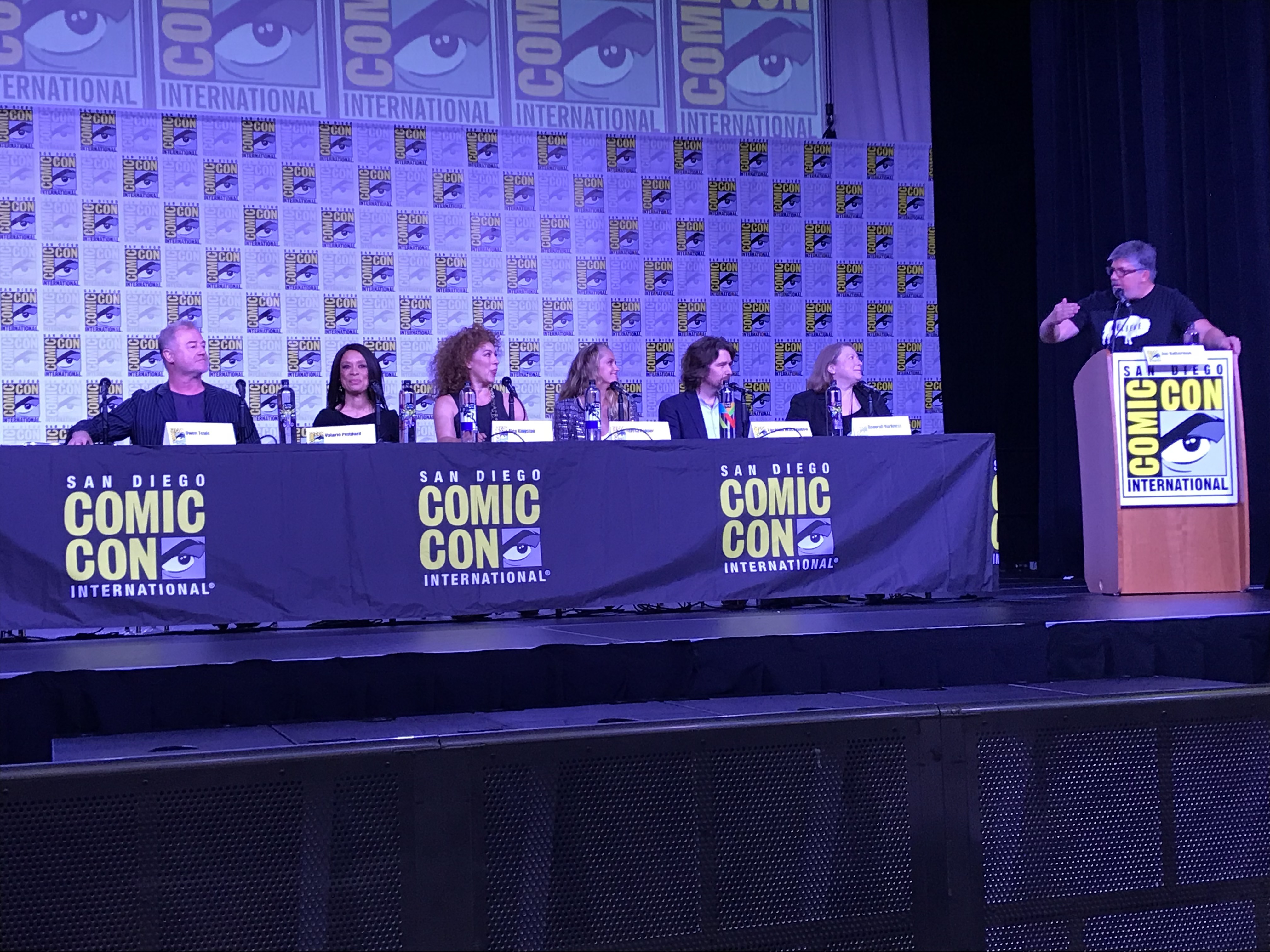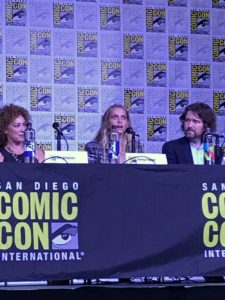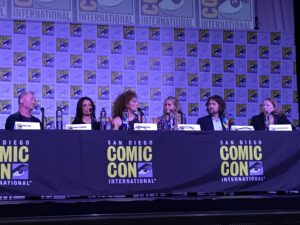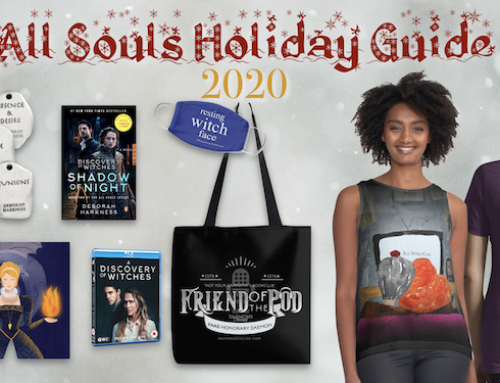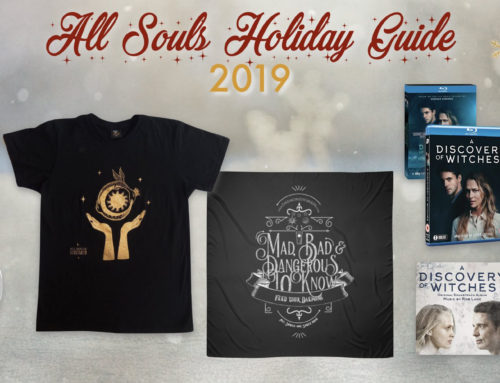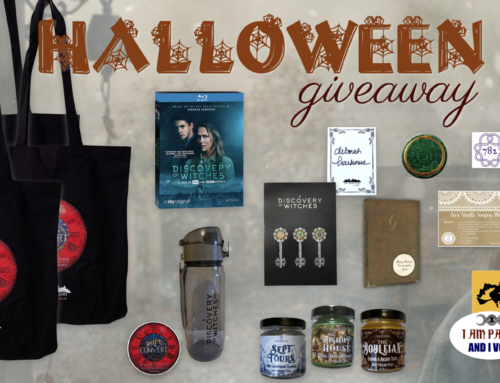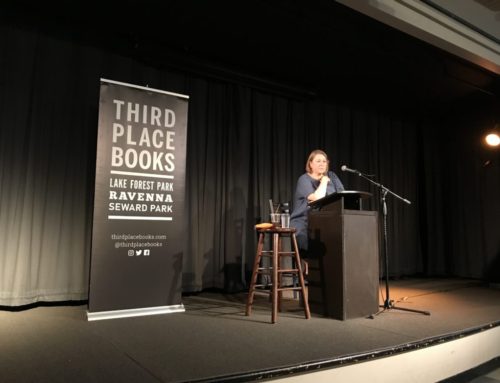We were very fortunate to be invited to a press roundtable at San Diego Comic Con and got to chat with the effervescent cast and producers of A Discovery Of Witches. But before we meet the witches (and producers), here’s a summary of what was announced at San Diego Comic Con on Thursday, July 19th:
• A Discovery Of Witches will premier on September 14 on Sky One in the UK.
• In the US, it will be available on streaming platforms, Sundance Now and Shudder. Later on Instagram, Sundance Now wrote that the series would air in early 2019.
The producers and cast were the same that had previously spoken during the panel in Hall 20: Deborah Harkness, Lachlan MacKinnon, Teresa Palmer, Alex Kingston, Valarie Pettiford, and Owen Teale.
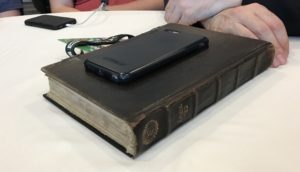 In case you wonder how a press roundtable works, in this instance, we had three round tables with about 5-6 press, who spoke with 2 guests at a time for about 15 minutes. We started with Deborah Harkness and Owen Teale, then Teresa Palmer and Lachlan MacKinnon, and finally, Alex Kingston and Valarie Pettiford. Ashmole 782 was quietly sitting on the table while Teresa and Lachlan’s round table was going on.
In case you wonder how a press roundtable works, in this instance, we had three round tables with about 5-6 press, who spoke with 2 guests at a time for about 15 minutes. We started with Deborah Harkness and Owen Teale, then Teresa Palmer and Lachlan MacKinnon, and finally, Alex Kingston and Valarie Pettiford. Ashmole 782 was quietly sitting on the table while Teresa and Lachlan’s round table was going on.
Here’s what everybody shared with us.
Deborah Harkness and Owen Teale
Press: The TV adaptation is not from Diana’s point of view. Does it provide the freedom to add to the story?
Deborah: [inaudible] what was everybody else doing on Friday night? Where was Peter Knox on Friday night when she pulled that book out? And, so it was about just taking the story and then just sort of inching it out and inching it out. And where was Marcus? Where was Matthew? How did that all fit together? And then once that happens, you could enter it from all of these different places and pick up, so we get to see sort of the stories of all those people who we only ever see through Diana’s. We actually get to see them through their own experiences and their own eye focus. It’s been pretty fun because I knew all that stuff, but it wasn’t on the page because I had to know that. But to see them all kind of go there and be like, “oh okay so that’s what we’re doing,” is really great. I had quite a scream out in the car cause it suddenly hit me, like oh my God, this is happening.
Owen: It’s real.
Deborah: Yeah, it’s real.
Press: Did you whisper all those scenes to the writers?
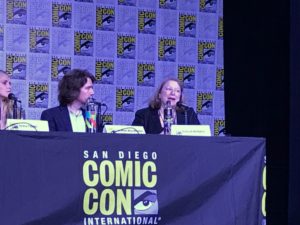 Deborah: No, I think I just said to them when Diana is in the Bodleian and then she picks up the book, Jillian is somewhere. Knox is somewhere. Everyone is somewhere in the story, and they have to kind of converge, so what is that story that we’re going to tell them? Now if they come to me and said, “Well, Peter Knox is in the Bahamas captaining a boat,” I would’ve been like, “okay, let’s rethink that.” They have a pretty grasp of the characters, so they were very close to something I would’ve imagined.
Deborah: No, I think I just said to them when Diana is in the Bodleian and then she picks up the book, Jillian is somewhere. Knox is somewhere. Everyone is somewhere in the story, and they have to kind of converge, so what is that story that we’re going to tell them? Now if they come to me and said, “Well, Peter Knox is in the Bahamas captaining a boat,” I would’ve been like, “okay, let’s rethink that.” They have a pretty grasp of the characters, so they were very close to something I would’ve imagined.
Press: Can you talk about the casting of Theresa? How, what went through your mind when you heard she, were you acted in it? Is this how you thought she’d look?
Deborah: Well, she looks exactly like she’s described in the book. Right down to the crazy, wild eyes, so I thought this was too good to be true. There’s no way, there’s just no way. And she’s so articulate, and she’s just so like her in so many ways. In terms of her fierceness, and her courage, and her sense of fun when you’re on set. So, for me, with all of the cast members, once they said, “what about so and so for the part?”. Now when they said… I wanna say, “okay, he’s never going to do this. He’d be fabulous, he’s never gonna do it.” And they said, “Well, we think he might.” And so I was like, “oh my God!” So yeah. All the characters are just so on point for who they’re playing. All the actors, all the characters have just kind of gotten their experience.
Owen: Well you have to, I guess, you have to give it over. It’s that thing, it’s your child, and then you have to just give it over to a team of creators, and then they in a way have to give that to the actors, and each point of collaboration, you can fall out, fall in, and fall out, in any way you have to make that so you don’t get stuck at any point, you don’t belabor it, but you do have a very healthy, vigorous debate. And personally, I then have the right to say, “I’m gonna stick up for Peter Knox.” I’m not taking an overall view anymore, that bit is done. I’m in. So I’m gonna give this guy the best possible ride that I can give him, and let that provide drama there for an element that you can bring in.
Deborah: Well, that was one of the first conversation we had. Well you said to me, “I have a few questions to ask.” And they were all about sort of his integrity, and what he believed and what he felt. And again, as the author I came up with all of them, and none of them are 100 percent wonderful. So it was really important to me that the actors not want to smooth out all of their rough edges and make them unbelievable. And I don’t want people to watch that on television, I want people that can think, “oh God, I’ve felt that way, I’ve totally felt that way,” and be able to kind of go from there.
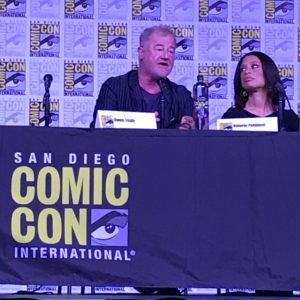 Owen: One of the big things for me was, which we mentioned just now as we were doing the panel on it, was that they never lose their connection. However, their powers vary within the witch world for instance. Theresa is phenomenally gifted which has been given. And however much that goes on, it never loses its connection with what it means to be alive as a human being. And so it’s relatable whatever they do, they’re like super human beings. Not just arbitrarily fantastical monsters, but they are treated as such and that’s why they hide in daylight by the human race. I guess what I’m alluding to in a long way, is I love the fact that you can see the parallels. It means something to be alive today, it’s all in the show. For me, that’s it. My hand is out. Compared to a lot of stuff that’s come in and playing your cards like I did in France and having been in danger and made that successful to be a bad guy as it were and to take the flack of that it’s going to be quite easy. I could to play a lot of mean characters, basically what I’m saying, but this one really has an integrity. And therefore, you need that, and I’m not going to bring about drama. And I would relish look forward to the next stage of the journey.
Owen: One of the big things for me was, which we mentioned just now as we were doing the panel on it, was that they never lose their connection. However, their powers vary within the witch world for instance. Theresa is phenomenally gifted which has been given. And however much that goes on, it never loses its connection with what it means to be alive as a human being. And so it’s relatable whatever they do, they’re like super human beings. Not just arbitrarily fantastical monsters, but they are treated as such and that’s why they hide in daylight by the human race. I guess what I’m alluding to in a long way, is I love the fact that you can see the parallels. It means something to be alive today, it’s all in the show. For me, that’s it. My hand is out. Compared to a lot of stuff that’s come in and playing your cards like I did in France and having been in danger and made that successful to be a bad guy as it were and to take the flack of that it’s going to be quite easy. I could to play a lot of mean characters, basically what I’m saying, but this one really has an integrity. And therefore, you need that, and I’m not going to bring about drama. And I would relish look forward to the next stage of the journey.
Press: Getting a little high with [inaudible], there’s the four quadrants of older and younger men and women. This is a show that primarily kind of appeals to older woman, which is a neglected quadrant I think, especially in this, the high span of communities like sci-fi and all of that. How do you feel now being part of that now with Outlander? Pretty much, just Outlander is what I can think of.
Deborah: What I’m always struck by is it seems to me that on a very superficial kind of sense, there’s a lot of movies about women in their 20s, and there’s a lot of movies about women having nervous breakdowns in their 40s and 50s. And there’s very little about women in the middle part, in their 30s, who are… I teach 18 to 21 year olds, who I hope go on to have really rich and wonderful lives past the age of 21, and maybe don’t have total mid life crisis at 45 where their whole life comes apart. So, for me I was like, let’s focus. I love being in my 30s, you get the sense that you kind of know something, but you had a long time to look forward to ahead. And I thought, why don’t we explore that more? So what’s interesting is that when the first book came out in 2011, that was 7 years ago, some of the people who started reading this book when they were 33, Diana’s age, are now 40. And I kind of thought, because I don’t write super fast, I though, wouldn’t it be nice to tell people’s stories in various stages of life? To have people who are in their 20s, their 30s, their 40s, their 50s because every stage brings something new to it. So I don’t even think of it as being something that’s about women at a certain age, but more just really reflecting the kind of wonderful diversity that exists between age, as well as other ways. I think that’s kind of a level of diversity we don’t often think about. If you’re 30, do you have a really close friend who’s in their 70s, who’s not your mom? Cause it might really enrich your life if you did. Is that the historian in me talking?
Owen: No, it’s good. It’s rich stuff. There’s a big, thick scene that we’re mining through you. And maybe not a lot of people are putting those elements together, whether they… I think as an industry, whenever anything becomes an industry, you look to what’s gonna sell, the commercial aspect. If something’s been done already and it worked, let’s jump in there and just redo it and change the names. I don’t think that works anymore. I like the fact that there’s a great diversity in platforms. I don’t understand it all streaming services, don’t get me started. But the fact that the BBC, the big thing that’s come out that the average age of people who are watching the BBC is up to about 55 or 60. Because, in the UK, we have to pay what’s called a trip television license. It’s a state-run thing, and I post to the BBC. So that is there as a service to the people, but increasingly, it’s having to fight now in a market place with commercial streaming services. And at the moment, they’ve really altered the world. But I think that’s good. It’s shaken the whole world.
Deborah: I think it has brought a whole lot of diversity. And I think if what comes out of it is that people take women between the ages of 30 and 45 more seriously as a market that needs to be paid attention to and engaged with, I am totally thrilled to think the discovery of which this helps to make that point. Because I think often the market is pitched to different constituencies. And that’s not that it’s bad, but I would love to think that there was something that was on television, that was like, yeah this speaks to me and my life and where I am.
Owen: And you’ve got a great lesbian relationship in it, and they’re not stigmatized for that.
Deborah: Right.
Owen: They’re just real people. It’s not an issue. It’s not like this is a big thing, how are they accepted?
Deborah: And a lot of readers will come up to me at signings and events and say, “thank you so much for having gay and lesbian characters where their sexuality isn’t the thing that makes them important to the story.” And you hear that and you just think, wow yeah, thank you. I just was fascinated in them, but I love it if it speaks to these bigger issues. I think that it’s a win for everybody.
Press: So we talked about the agency, but do you think the LGBT couple will also attract that audience to the show as well?
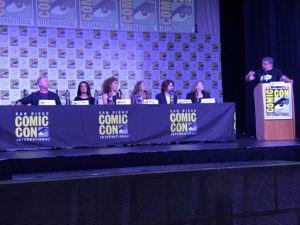 Deborah: Well, George Takei certainly seems to think so. But, I don’t know because I think that I’m one of those people who just believes that people find the things, regardless of their gender, their race, their sexual orientation, their ethnicity, their class, whatever, they find the story that speak to them. And it was always my intention to write a story that felt like the world I live in, which is diverse and which has lots of different people from lots of different places. And I don’t always see that embodied on the screen in a way that makes it seem like this is what people’s real lives look like. And I just really wanted to do that, so I hope that they like it. I hope that they come along and fall in love, as I think the people in the audience of the panel did. Did you just totally fall? Can I just totally come and hang in your house? And the banter.. Yeah, it’s hard not to want to do that.
Deborah: Well, George Takei certainly seems to think so. But, I don’t know because I think that I’m one of those people who just believes that people find the things, regardless of their gender, their race, their sexual orientation, their ethnicity, their class, whatever, they find the story that speak to them. And it was always my intention to write a story that felt like the world I live in, which is diverse and which has lots of different people from lots of different places. And I don’t always see that embodied on the screen in a way that makes it seem like this is what people’s real lives look like. And I just really wanted to do that, so I hope that they like it. I hope that they come along and fall in love, as I think the people in the audience of the panel did. Did you just totally fall? Can I just totally come and hang in your house? And the banter.. Yeah, it’s hard not to want to do that.
Press: In a way, your show and the book is educational, and people can [inaudible] blogs in a way they haven’t [inaudible]
Owen: That would be great.
Deborah: Well, it’s all about… I’m a historian, so what I do is I try to teach empathy. Empathy is a powerful thing, and it’s something this world is sorely in lack of, and it’s the ability to look at the world in another person’s set of eyes. And I think what Owen and his cast mates do, and what the show does, is it give you a whole lot of characters for you to go, “Okay, wait a minute. What does the world look like if through that set of eyes?” I think that’s one of the great gifts of television and film is that it does that. And I’m with you, if people are like get to thinking about some of the things that they believe, or they think they know, or they imagine they feel in a different way, this teacher would be okay with that.
Deborah: Thank you so much you guys! So good to see you!
#
Teresa and Lachlan
Press: I assume your read the [All Souls Trilogy] books. What went through your mind when you first read them? Did you know them before this role?
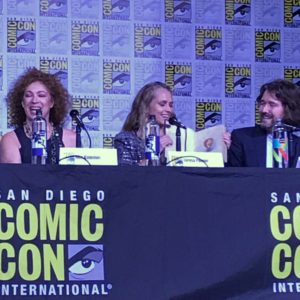 Teresa: I actually didn’t. I was just laughing about the fact that I have three sons and so I haven’t read since they were born. I haven’t read anything since they were born. I think they came out right as I was having children so I wasn’t familiar with the books but I read the script and instantly became obsessed with it. I couldn’t stop reading it. I rang my agent and I said, “What is going on with this? How can I get involved?” He set me up with Jane Tranter and Jane was just as brilliant woman who spoke so passionately about the world. She knew the characters back to front, inside out, and she really set it up for me. I left that meeting just feeling like she was my character. I had to be Diana. I felt so connected to her in every way.
Teresa: I actually didn’t. I was just laughing about the fact that I have three sons and so I haven’t read since they were born. I haven’t read anything since they were born. I think they came out right as I was having children so I wasn’t familiar with the books but I read the script and instantly became obsessed with it. I couldn’t stop reading it. I rang my agent and I said, “What is going on with this? How can I get involved?” He set me up with Jane Tranter and Jane was just as brilliant woman who spoke so passionately about the world. She knew the characters back to front, inside out, and she really set it up for me. I left that meeting just feeling like she was my character. I had to be Diana. I felt so connected to her in every way.
I met with Matthew Goode, who was already cast, and we were going to do an hour and a half workshop and chemistry read just to make sure that we got on and we had some chemistry because obviously that’s a pivotal part of our story. We wanted to make sure that we fit together. Straightaway we were laughing. Straight off the bat. We were just such goofballs together, we were like brother and sister, really interacting in a way that felt organic and fluid and we just put the scenes down and I remember Kate, our casting director, was like, “Guys, we actually have to get some work done. I know you guys are having fun talking with each other but we do have to film some of the scenes.” From day one it was like that between Matthew and I and we’re both so thrilled to be part of the show.
Teresa: Then I read the books after that point, which is brilliant. Actually, it was an audiobook that I listened to, because again the reading for me, I’m constantly being interrupted by little people but in the car they are strapped in and they can’t interrupt me and I have my audiobook on so that’s how I read the books.
Press: You say you connected with Diana really quickly. What qualities did that, that made you connect with her?
Teresa: I just loved her passion. I love her commitment. I felt she was this beautiful flower where she’s a hyper intellectual woman and yet she was denying this whole other side of her life and her being. I loved her vulnerability that and the fragility in that and I just felt such potential that she had so much potential and she just had to lean into it and the further along I got into the book I just became so proud of her and how she started to unravel and she blossoms into her authentic self. I can really relate to that journey. I think even any of us from the age when we’re teenagers to when we enter our later 20s and 30s, gosh, we’re all over the place when we’re younger and then you finally land into a space in your life where you’re feeling good about yourself and you’re leaning into who you are and I felt like she took that journey in that first book and I loved it. It was a beautiful story.
Press: I’d like to piggyback off that question. You mentioned this already that part of what drew you to the character of Diana is this innate tension within herself between the academic, the scientist, the historian vs. the supernatural. How would you say that tension manifests in your portrayal of the character?
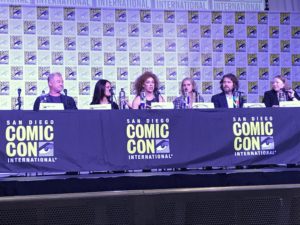 Teresa: It’s quite interesting because she’ll be in the middle of doing a lecture or just about to go and have a lecture but magic pops out in a crazy way. I think that that’s this swinging pendulum. She’s trying to keep this at bay but it is who she is and it keeps coming and then it starts escalating. It’s coming out more and more and more and she doesn’t have such a tight grip on her anymore and I love that because it’s just organic. It’s bound to happen. I think you see that journey…
Teresa: It’s quite interesting because she’ll be in the middle of doing a lecture or just about to go and have a lecture but magic pops out in a crazy way. I think that that’s this swinging pendulum. She’s trying to keep this at bay but it is who she is and it keeps coming and then it starts escalating. It’s coming out more and more and more and she doesn’t have such a tight grip on her anymore and I love that because it’s just organic. It’s bound to happen. I think you see that journey…
Lachlan: I think we’re getting into spoiler territory very quickly.
Teresa: I know, I know. He’s [Lachlan] like, “Don’t say it. Don’t.”
Lachlan: It’s amazing and wait until you see it. [crosstalk]. There’s so much more development.
Press: We saw some of the scenes at the panel but can you talk about filming some of the magical stuff, what you can say? How is it to…?
Teresa: I probably already blew it on that table. I was like, “She does this, this, this.” Wait a minute.
Lachlan: The reason I mention it is because obviously you want to keep certain things away from the fans. Of course we can. There’s small moments in the first episode and then by the end of the third episode … where they are.
Teresa: It takes them to another level where she’s the most powerful witch there is. I think my idea of witchcraft is it’s smaller than what she can do. You do some spells and that’s it. I grew up watching The Craft. This just takes it to a whole other level. Her power is so immense it really is otherworldly. I won’t spoil it anymore but just wait. From episode six onwards you start to see things that will absolutely blow your mind. You’ve all probably read the books you know what I’m talking about.
Lachlan: What I think is particularly exciting about the way the magic, itself, is often Matthew’s relationship to the magic because he’s aware, he’s been around for so many hundreds and hundreds of years, he understands magic and he knows how rare it is to find a witch that has the powers that Diana has.
Teresa: I think he’s quite shocked as well as at the level of power that she has. It’s so exciting for him and enticing, but wow. I think it’s also hard for him to see that too, in a sense.
Press: If we see her with all these extreme powers when she’s suppressing it. Will we see her power possibly grow as she starts to embrace it?
Teresa: Yeah. I can’t.
Press: Can you talk about how they’re shot is it practical stuff or is a lot of imagining for you?
Teresa: Practical.
Lachlan: Principally, especially early on, we use a lot of practical elements. For example, one of the sequences involved wiring just because there’s nothing better than actually having your character fly through the frame without it feeling created in the effects. Obviously we do use…
Lachlan: Obviously we do use effects, but it’s more to supplement what’s there.
Teresa: The practical. I got to be on some wire. It’s not spoiling anything. I was on some wires towards the end. It was fun. I had a day of being upside down on a wire in the woods. That was so fun, actually. The woods was great. My very last scene of the entire show was a blue screen and I was upside down on a wire hanging making noises for eight hours.
Lachlan: With the jet engine in your face.
Teresa: That’s right, yeah. With the huge industrial fan blowing at me.
Press: Did you have any funny moments on the set?
Teresa: Matthew. Just such a goofball. Him and I, there’s a scene in the show, I won’t say what scene it is, but Matthew and I have really funny banter together so we are constantly laughing and mucking around and goofballing around. I don’t know if you were there that day when we were in the forest, we had the scene where we were talking about my father’s ability.
Lachlan: Yes, I know what you mean.
Teresa: We couldn’t stop laughing. For an hour and a half we kept trying to film the scene but we just were laughing the whole way through the scene. To the point where the director was like, “Well, I think we’re just going to have to make this scene a funny scene.” Because we just couldn’t play it straight. That was our kind of relationship. That happened many times. There’s a moment in this book, I’ll show you the image that we’re talking about, he asks me to describe the book and I talk to him about that I saw a picture of the alchemical child floating upside down in a vessel and for some reason Matthew thought that line was the funniest line he had ever heard in his life that on close-up he would ask me not to say the line. He was like, “I will just react. You don’t say the line.” And vice versa, he would have to turn around and I’d have to do it to his back because we were making each other laugh so much. We really had a fantastic time. A lot of laughing went on.
Lachlan: I think it’s a great set chemistry. I agree with you about making the show. I think it’s a testament to, especially, our cast and crew because there was that bond there and I think that when people work together and basically they’re doing something they enjoy to do it just makes it an enjoyable experience. I think it shows on screen
Teresa: Mm-hmm (affirmative). Yeah.
Press: Can you talk about the tone. What tone are you hoping for with the show?
Lachlan: We thought it was interesting. It’s really an interesting question because we’ve gone on a journey with the tone because at the beginning we wanted to set the show up in a way that felt grounded and really rooted in present day and in a world where humans exist alongside creatures. We went on a journey in the early episodes with not a lot of magic, but obviously as we get on in the series it… We’re flying.
Teresa: Takes off. We’re flying. Ha ha ha.
Press: It’s all the elements that you get, it’s romance, it-
Lachlan: Identity one of the strong elements.[inaudible] love story between Matthew and Diana so I think you can’t escape from that. There’s also a really strong filler element with the manuscript because everybody believes that the best that the answer is held within the book and as Owen, who plays Peter Knox, was saying, he’s got this vision that if he can find the book, he’ll find out how to create the creatures. And if he knows how they were created, then he can un-create them.
Teresa: Which I don’t want any part of.
Press: What’s it like working on a show, and [inaudible 00:11:15] based on a reaction yet, but where it has such a devoted fan-base, so people who are just very passionate about it?
Lachlan: We always want to serve the audience ultimately. We’re not making a show for ourselves, and then why we work mostly through the, because that transition from the page to the screen is such a long journey to go on, and what works on the page … Because you’ve got first-person narration, it means that you’re aiming to describe a world, whereas you can’t do that with television, so with some of the aspects of the show we’ve maybe gone a little bit further into the book and pulled some story later in the book for the beginning. We set the world and we set the characters and it felt like the right way for the project.
Teresa: I also have found it thrilling to have this energy behind the series. I remember when I got cast, I looked on my Instagram and it had jumped up a hundred-thousand people and I was like, what?! And then I started seeing All Souls Con and Daemons Domain, and then I started interacting with a lot of the people behind these accounts.
Teresa: The support has been phenomenal, the excitement is of another level, and it helps me want to be the best I can possibly be, and tell the most authentic story, and I think we all really appreciate the support of the fans. You can feel it. I remember being on set, and the comments on my Instagram and my interactions. It makes you feel good and makes you want to do your very best work. Like today, meeting everyone here, it’s been wonderful. It makes me so excited to finally get the show out and get them to all the patiently-waiting fans who’ve been so supportive.
Press: Who are currently going mad in the US.
Teresa: I know! Oh my god, I think that’s probably the number one question I keep getting asked on my Instagram.
Teresa: “When will we see it in the US?” Yeah.
Press: Can you talk about your first meeting with the author as well. Did you have lots of questions for her? Were you … What was going through your mind and what did you–?
Teresa: She is the warmest person that I’ve met in my life. She’s just one big ball of love, and she came and gave me this big, bear hug. She was like, “You are my Diana.” I actually see a lot of Diana in Deb, just the way she is and her being, and obviously Deb’s a historian and she’s a rower. They have a lot of similarities.
Teresa: She had unwavering support and faith in me, and to come into a series with a lot of eyes on her … I had the author, the one who wrote these characters, be so loving and giving. It made my job so much easier. And I had her on speed-dial. I could call her at any time. She was on set a lot, and I could say, “How would I play this? What do you think her mindset is? Am I going down the right track? This is how I’m feeling,” and she was just so generous and open and communicative and the most beautiful blessing, ever.
Press: A fan was giving me loads of compliments about you. She kept on saying, it’s exactly how I pictured it, even the eyes, everything.
Teresa: Oh my gosh.
Press: It was great to see the fans’ response when your picture was released, because they were just so, nuclear-ly excited.
Teresa: It was really funny because I didn’t understand that they were like, “We’re going to pick … This is the photo we have chosen, and Deb chose the photo’s specifically.” I was like, “Oh, fantastic.” Didn’t realize why, but then of course it’s because people have an idea of how she looks, and Deb found the perfect photo, and it was great.
Teresa: Great meeting you. Thank you so much.
Press: So nice to meet you. I’ll see you on Instagram.
#
Alex Kingston and Valarie Pettiford
Alex: Hi.
Press: I was in a Doctor Who panel earlier today and they were talking about the queer representation and how the relationship, it should … Like any other queer relationship, you want it to educate people in a way so they understand and they learn and … being queer wasn’t why you were in the story. Could you talk a little bit about-
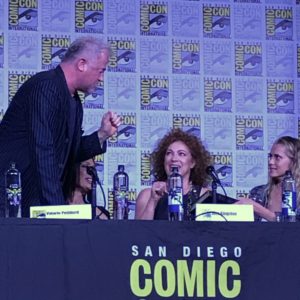 Valarie: Right, it had nothing to do about being a lesbian, at all. Gay. It had nothing to do with it. Is not love a relationship? Us raising this incredible child that went through this horrific journey with her parents getting murdered, her sister, my best friend … That’s all it’s about. Then, of course, you add, we are creatures, that we are living in plain sight, and always having to hide. That’s what we’re having to hide. Not our love for each other. We have to hide that we’re witch, or demon or vampire. Then to culminate into losing who we are, we’re losing our powers. The vampires are losing who they are, the demons are losing who they are. We might become … extinct. That’s what that’s about.
Valarie: Right, it had nothing to do about being a lesbian, at all. Gay. It had nothing to do with it. Is not love a relationship? Us raising this incredible child that went through this horrific journey with her parents getting murdered, her sister, my best friend … That’s all it’s about. Then, of course, you add, we are creatures, that we are living in plain sight, and always having to hide. That’s what we’re having to hide. Not our love for each other. We have to hide that we’re witch, or demon or vampire. Then to culminate into losing who we are, we’re losing our powers. The vampires are losing who they are, the demons are losing who they are. We might become … extinct. That’s what that’s about.
Alex: Yeah, there’s no … prejudice when it comes … In fact, it’s not even that there’s … It’s not even an issue, and that’s what’s so great. It’s just, this is it, this is just who we are. We’re a couple like any other couple and I love that about the book, and I love that in the way the book was adapted for the show.
Alex: We did have one … conversation, let’s put it that way, with one of the producers. We wanted to … furnish the interior of our house with photographs from our past and stuff like that so that it really felt real. One of the wardrobe supervisors, mothers, was a knitter, and she knitted us two, pink pussycats. So we shot this scene where … We had a photo of us with the hats and we shot a scene where we were both wearing our hats coming back with our groceries, and one the producers said, “No, you can’t do that. It’s political. You can’t do it. And it’s anti-Trump.” And I was like, “It’s not anti-Trump, it’s the women’s movement, and if we are living today in this world, we would have those hats.
Valarie: And we went to that march.
Alex: And we went to that march. And that’s what we have, we have a photo in the house of us at the march.
Alex: I did, because I went to Deborah and I said, “Come on,” and she was like, “Absolutely you’d have those hats. You wear those hats.” Then Jane turned around to us and said, “Totally, you wear that hat.” So, I’m wearing that hat, and the truth is … It just sort of doesn’t … But if you know. I said, it’s not about being anti-this-president. It’s about the women’s movement. So, yeah. I got my hat.
Press: Going off of that, could you speak to what it’s like working on a show where all of the key, creative, decision-makers are women?
Alex: Do you know, the thing is I sort of was not even aware. That’s the thing. It’s a little bit like the relationship between these two characters. You just go to work and work happens. And that’s, in a way … it’s not a dumb thing to highlight, but it shouldn’t even have to be highlighted. Do you know what I mean? It was a working day, and we had one of our DPs was female, we had a lot of female crew, but it was just like, this is how it is. But thank god for it, and thank god that it wasn’t, in a way, made an issue. It just was a working day, and that’s how it should be.
Valarie: And you know, we celebrated film … What is it, film …
Valarie: Women in Film Friday, so we said, “Oh look, guys, we need to take a photo.” And then when you look back at the photo and see how many women, it was like, “Yeah!”
Valarie: As you said, while working we’re just doing our job and we’re having the time of our life, we’re being taken care of and we’re doing great work and we’re getting together along well, but they’re women: come on. Right? But you don’t notice it until we took that photograph and it was like, oh my god.
Alex: So we took that photograph. It’s like, “Oh my God.”
Valarie: Yeah.
Alex: So hopefully that trend will continue. Where you do it because, why? You’re good enough to do it.
Valarie: Yeah.
Alex: Not because you’re a woman, no big deal.
Valarie: One of the things that I love most about this series is the importance of family. I mean the family we’re born into and certainly the family that you choose for yourself. So can you talk a little bit about how that theme manifests in your portrayal of your characters?
Alex: I think when you first see Sarah and Anne, for a large part of the beginning of the series, you just see them on the end of a phone, sitting on the porch, sort of having long distance telephone conversations with Diana, and getting terribly, terribly concerned. Because we’re hearing about vampires and what, what? And she’s not there in the bathroom, and you come on home here, no I’m not going to, what?
Valarie: I’m in love with a vampire! What?!
Alex: But I think that … I mean my God, they care about her. They are, you know they have this … They live in this gorgeous sort of bucolic valley in their lovely house, and it’s … And they’ve been very protective of Diana. But she’s had to, like any child, has to leave the nest at some point, and has to make their own way, and has to make mistakes. But the frustration I think that Sarah feels, is a frustration born out of deep love and care for Diana. And also, I mean you, the things that you know and that you hold in your heart that you don’t even share with me, are also born out of deep love and care for Diana, and for her well-being.
Valarie: And also for me being an outsider, coming into the Bishop home, you know what I mean? And coming into this family, they’re great parents. Diana had great parents, a great sister, and then them accepting you. Not even accepting me, but you know. And when I say, “accept” it’s not because I’m gay, or black, or anything like that. It’s accepting just you know, someone that she loves and wants to bring into her family. And I’m now part of the family. And then to be able to raise her child, this child. I mean and I’m trying to look for the word … Given that gift. They’ve allowed me to help raise it.
Alex: And nurture.
Valarie: And nurture.
Alex: Because you are the nurturing one.
Valarie: Right. But you know, coming into the Bishop home, because I’m not a Bishop.
Alex: But your a Mather. But they also both come from the Mather line …
Valarie: Yeah.
Alex: And the Bishop line go way back.
Valarie: Way back.
Alex: And so these two women also absolutely hold onto their heritage.
Valarie: Yeah.
Alex: And it’s crucial and important. And that’s the thing that they both try to instill in Diana, is recognize your heritage.
Valarie: Yes.
Alex: Recognize what you are, who you are.
Valarie: Ancestry.
Alex: Where you’ve come from and hold onto that.
Valarie: Yes.
Alex: Because it’s disappearing. And you know that is a huge part of the story.
Press: Neat. I’m happy that it got on the table. Okay, anyway. The books have got a very passionate fan base. Can you talk about the first time you sort of experienced people read the book, what you thought of it, and what can fans expect from this show, because there’s not much out there, but there’s a hunger, obviously.
Alex: There’s a hunger? I didn’t know the books. After I accepted the role on the strength of the adaptations, the script adaptations, I then started to read the first novel. And we’ve both talked about that. And it’s absolutely integral. You have to read the book, because the book actually then really informs you as an actor and gives you all of that background, and gives you all of the texture that you can call upon when you’re creating a role. But I have, because I’m not very good at social media I think, I have no idea about the fact that … So I don’t know how people passionate already think they are. I just hope that they like us.
Valarie: Right. That’s always the case. Please like us! Please like us! But because I am on social media, yes they are very passionate! But all from what I … From all the tweets that I get, and I read everything, and of course DM the following day, they love you. They’re so excited about me. And they’re so excited about us playing, and the choices that were made, that were made in casting.
Alex: Oh yeah!
Valarie: They really do. And as I said, I’m 50 percent of that table. I’m a huge fan of this novel. Harry Potter, come on! Lord of the Rings, I ain’t interested. So I get it. I understand it as a fan. I know what I have in my head, and I wanna see that as an actor, I am accepted so things have to change.
Alex: Right.
Valarie: And I might have not made that choice on that actor, but I’m gonna go with it, and end up falling in love with them anyway. But the fans have been awesome! Just on the fact that they know us from our other work, and I think they chose wisely. I really do!
Alex: Do you know what I also like just having watched the … We’ve seen the first four episodes. We’ve seen just sort of the … I mean they still have work to do on them, but we’ve been given the opportunity to look at them. And actually what I really like, I mean aside from the fact that it looks gorgeous, and it’s beautifully lit, it’s incredibly filmic, considering that it’s on digital.
Valarie: Yeah.
Alex: And they’ve come a long way with the digital format now. I mean it’s amazing how much depth there is. It looks more and more like film every day. But also I just think, we actually all look real. We look normal. You know we don’t look sort of glossy, over-made. I mean particularly let’s say, Theresa or Matthew. I mean they’re beautiful, they’re gorgeous, but they sort of look like real people. Not like such a Hollywood celebrities playing these people. So I think that’s … I think it sort of … It helps to really root the show. Because we’re all, you know, you can see all of not just our character flaws, but sort of just we are who we are.
Valarie: Yeah.
Alex: Physically. And I think that’s really good for the show.
Valarie: I do too. I do too. And it’s so important because with today, it’s HD and stuff like that. I mean I feel that today’s HD is meant for sports and animals, not actors. And so to have what they’ve given us, dramatically, that brings out the realness of the person. You’re not looking at … You see every pore, but it’s this thing of the roundness, and movements, and realness. As opposed to so high gloss, and real attention to the point just cinematically, and how it’s actually filmed. And then finding a nice balance between the digital realm, and the old film.
Alex: Yeah.
Valarie: That kind of performing, like God look at that lens! And everybody feel it! Thank you!
Alex: Thank you!

